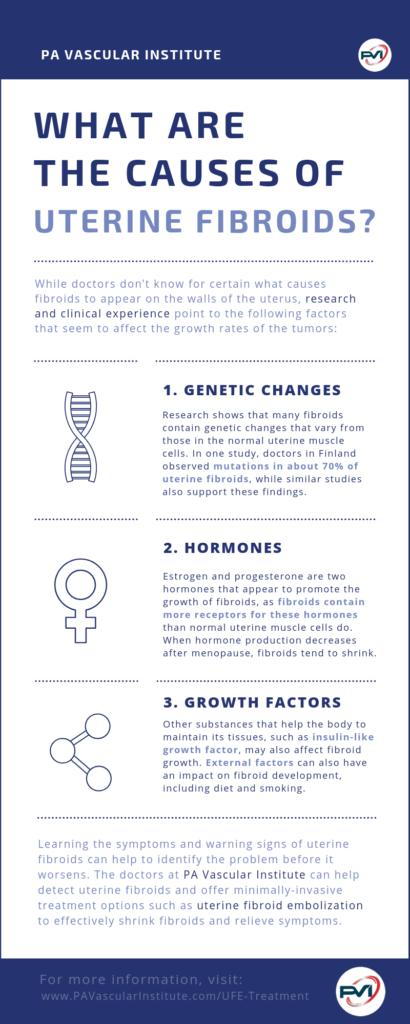If you have a heavy menstrual period accompanied by painful cramping, painful intercourse, and always have the urge to urinate, you may have uterine fibroids and not even know it.
While the name itself sounds very scary and alarming, uterine fibroids are noncancerous, benign lumps that are 100% treatable. In some cases treatment is not even necessary if the patient does not show symptoms or if she has already gone through menopause. Treatment will widely depend on the size and location of the fibroids, the patient’s general health, and other factors.
The scary part of uterine fibroids, however, is how you could have them and not even know it. Today our Philadelphia area UFE treatment specialists have got the 411 on some of the most common causes of fibroids, as well as what symptoms to look out for.
Causes of Uterine Fibroids
The exact reason of fibroids is unknown but what we do know is that fibroids tend to run in families and are often found in women with a family history of them. In some cases, fibroids are tiny and small and pose no problems at all, and in other cases, they can grow to weigh several pounds.

The following factors have been known to attribute to the presence of fibroids:
- Obesity
- Nulliparity (never before given birth to a child)
- Menstrual cycle onset before the age of 10
- African-American heritage
Symptoms of Uterine Fibroids
In most uterine fibroid cases you will not experience any signs or symptoms. Even the most massive fibroids that have been detected have not shown signs or symptoms and are only found through a routine pelvic examination.
If uterine fibroid symptoms are present you may be experiencing the following symptoms:
- Increased menstrual bleeding (and possible blood clots)
- Bladder pressure with an inability to go to the bathroom
- “Feeling full” in the lower abdomen
- Change in abdominal contour
- Constipation due to pressure on the rectum
If you notice any of the above symptoms, the medical staff here at PA Vascular Institute highly recommend scheduling an appointment to discuss if a uterine fibroid embolization at our Philadelphia, PA, office is right for you. The procedure is non-surgical, minimally invasive, and has a very quick recovery period.
Your health is important to us and even more important to you. Give us a call today!
